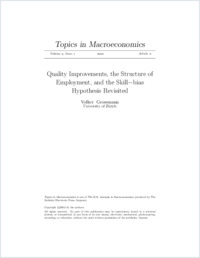Quality Improvements, the Structure of Employment, and the Skill-bias Hypothesis Revisited
BP2-STS
- Grossmann, Volker ORCID University of Zurich
- 2002
Published in:
- Topics in Macroeconomics. - 2002, vol. 2, no. 1, p. 1-25
English
This paper examines the impact of technological progress in the effectiveness of quality-improving, demand-enhancing activities on wage inequality and the employment structure in an ideal variety model of monopolistic competition. In a first step, it is shown that such technological change leads to a higher non-production employment share in the economy, in turn raising price mark-up factors for differentiated goods. Moreover, accounting for the fact that demand-enhancing activities are skill-intensive, the model provides a novel mechanism for the way in which new technologies affect the relative demand for skilled labor in the economy. Although an increased effectiveness of product innovations raises the demand for skilled labor in the differentiated goods sector, the impact on wage inequality is generally ambiguous if, in addition, there is a low-skilled intensive, homogenous goods sector. This is because higher mark-ups in the differentiated goods sector may shift the goods demand structure towards standardized goods. Finally, these results are compared with the impact of "skill-biased" process innovations, which have primarily been considered in the theoretical skill-bias literature. Using a simple illustration, it is argued that, once analytically distinguishing between production-related and quality-improving tasks, skill-biased process innovations do not necessarily lead to a rise in skill premia even in a one-sector model.
- Faculty
- Faculté des sciences économiques et sociales et du management
- Department
- Département d'économie politique
- Language
-
- English
- Classification
- Economics
- License
-
License undefined
- Open access status
- green
- Identifiers
- Persistent URL
- https://folia.unifr.ch/unifr/documents/323737
Statistics
Document views: 105
File downloads:
- qualityimprovementsthestructureofemployment: 134
